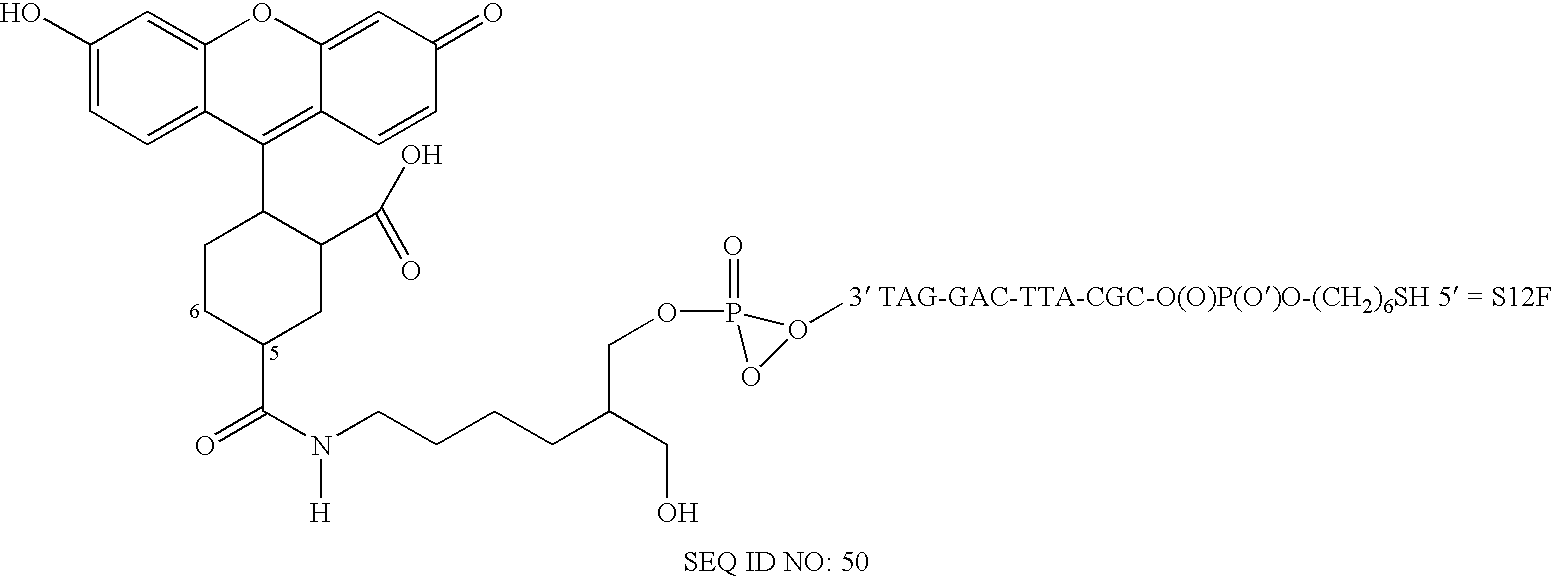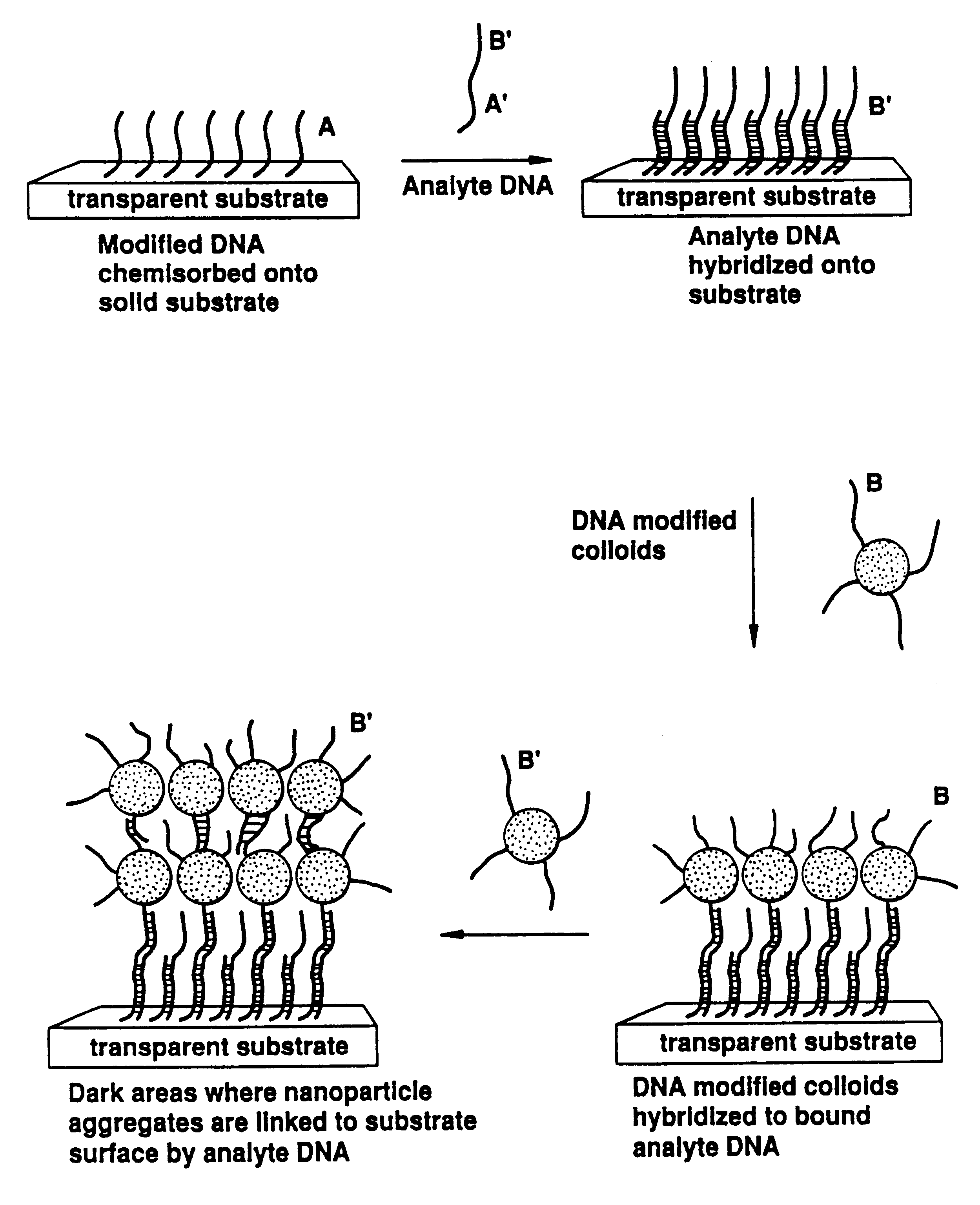Nanoparticles having oligonucleotides attached thereto and uses therefor
- Summary
- Abstract
- Description
- Claims
- Application Information
AI Technical Summary
Benefits of technology
Problems solved by technology
Method used
Image
Examples
example 1
Preparation of Oligonucleotide-Modified Gold Nanoparticles
A. Preparation Of Gold Nanoparticles
[0358]Gold colloids (13 nm diameter) were prepared by reduction of HAuCl4 with citrate as described in Frens, Nature Phys. Sci., 241, 20 (1973) and Grabar, Anal. Chem., 67, 735 (1995). Briefly, all glassware was cleaned in aqua regia (3 parts HCl, 1 part HNO3), rinsed with Nanopure H2O, then oven dried prior to use. HAuCl4 and sodium citrate were purchased from Aldrich Chemical Company. Aqueous HAuCl4 (1 mM, 500 mL) was brought to reflux while stirring. Then, 38.8 mM sodium citrate (50 mL) was added quickly. The solution color changed from pale yellow to burgundy, and refluxing was continued for 15 min. After cooling to room temperature, the red solution was filtered through a Micron Separations Inc. 1 micron filter. Au colloids were characterized by UV-vis spectroscopy using a Hewlett Packard 8452A diode array spectrophotometer and by Transmission Electron Microscopy (TEM) using a Hitachi ...
example 2
Formation of Nanoparticle Aggregates
A. Preparation of Linking Oligonucleotide
[0367]Two (nonthiolated) oligonucleotides were synthesized as described in part B of Example 1. They had the following sequences:
[0368]
3′ ATATGCGCGA TCTCAGCAAA; and[SEQ ID NO:1]3′ GATCGCGCAT ATCAACGGTA.[SEQ ID NO:2]
[0369]Mixing of these two oligonucleotides in a 1 M NaCl, 10 mM phosphate buffered (pH 7.0) solution, resulted in hybridization to form a duplex having a 12-base-pair overlap and two 8-base-pair sticky ends. Each of the sticky ends had a sequence which was complementary to that of one of the oligonucleotides attached to the Au colloids prepared in part C of Example 1.
B. Formation of Nanoparticle Aggregates
[0370]The linking oligonucleotides prepared in part A of this example (0.17 μM final concentration after dilution with NaCl) were added to the nanoparticle-oligonucleotide conjugates prepared in part C of Example 1 (5.1 nM final concentration after dilution with NaCl) at room temperature. The so...
example 3
Preparation of Oligonucleotide-Modified Gold Nanoparticles
[0378]Gold colloids (13 nm diameter) were prepared as described in Example 1. Thiol-oligonucleotides [HS(CH2)6OP(O)(O−)-oligonucleotide] were also prepared as described in Example 1.
[0379]The method of attaching thiol-oligonucleotides to gold nanoparticles described in Example 1 was found not to produce satisfactory results in some cases. In particular, when long oligonucleotides were used, the oligonucleotide-colloid conjugates were not stable in the presence of a large excess of high molecular weight salmon sperm DNA used as model for the background DNA that would normally be present in a diagnostic system. Longer exposure of the colloids to the thiol-oligonucleotides produced oligonucleotide-colloid conjugates that were stable to salmon sperm DNA, but the resulting conjugates failed to hybridize satisfactorily. Further experimentation led to the following procedure for attaching thiol-oligonucleotides of any length to gold...
PUM
| Property | Measurement | Unit |
|---|---|---|
| Time | aaaaa | aaaaa |
| Time | aaaaa | aaaaa |
| Diameter | aaaaa | aaaaa |
Abstract
Description
Claims
Application Information
 Login to View More
Login to View More - R&D
- Intellectual Property
- Life Sciences
- Materials
- Tech Scout
- Unparalleled Data Quality
- Higher Quality Content
- 60% Fewer Hallucinations
Browse by: Latest US Patents, China's latest patents, Technical Efficacy Thesaurus, Application Domain, Technology Topic, Popular Technical Reports.
© 2025 PatSnap. All rights reserved.Legal|Privacy policy|Modern Slavery Act Transparency Statement|Sitemap|About US| Contact US: help@patsnap.com



